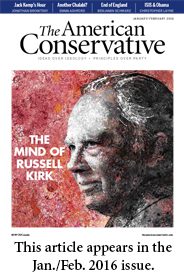How Conservative Was Jack Kemp?

When prominent conservatives pass away, they often receive polite, if not laudatory, obituaries from publications like the New York Times and The New Republic. This has led those on the right to sarcastically quip that, for those on the left, the only good conservative is a dead conservative. But these days, a lot of conservatives seem to feel the same way about their own fallen comrades.
Within particular corners of the right, it’s fashionable to brand Ronald Reagan a “RINO” because of his deficit spending. Even William F. Buckley Jr. has been characterized as a neo-statist as of late. It won’t be long then before Peter Viereck, Frank S. Meyer, and Willmoore Kendall are similarly chopped down, unmasked as Trotskyist Trojan horses by self-anointed priests and priestesses of ideological purity.
One of the most pivotal yet least studied political episodes of the modern era has been conservatism’s shift from organic guiding notions—e.g., Russell Kirk’s “Ten Conservative Principles”—to a narrow voting agenda. Conservatism has gone from being a body of eternal precepts to a list of temporal policies.
Jack Kemp—pro quarterback, GOP congressman from New York, and one-time vice-presidential nominee—throws into sharp relief the nature of conservatism’s evolution, or rather its de-evolution. It’s no coincidence that a growing number of politicians are examining Kemp—more precisely, his unorthodox record—at a moment when the Republican Party finds itself roaring forward on the local and state levels but slipping up on the national stage.
That’s the jumping off point for this first biography of Kemp, by veteran journalists Morton Kondracke and Fred Barnes. Jack Kemp is excellently written and expertly researched, an invaluable addition to the historiography of the Reagan years.
“Jack Kemp,” the authors open, “was the most important politician of the twentieth century who was not president, certainly the most influential Republican.” Their thesis centers upon two contentions: Kemp was not only “the leading political evangelist of the supply-side movement,” he was also “the idea man” behind Reagan’s key economic achievements, the Economic Recovery Tax Act of 1981 and the Tax Reform Act of 1986.
Kondracke and Barnes make their admiration for Kemp clear, and they go further, sounding a clarion call: “Jack Kemp’s spirit—and his policy ideas,” they declare, “could again help the country turn around.” By policy ideas, they mean his “supply-side formula,” which yielded “robust growth, impressive job creation, and a surge in the American stock market.” By spirit, they mean his relentless optimism. Kemp was convinced by his Christian Science faith that all hurdles could be surmounted with “will and effort” because “all reality is spiritual.” This attitude allowed him to fight on after he had been knocked down over and over again—sometimes literally, on the gridiron.
Yet Kemp’s ebullient outlook is also to blame for derailing his grandest political ambition. It prevented him from cultivating the killer instinct needed to reach the highest office in the land. It further caused him, naïvely, to see only the good in people. In an interview with the Boston Globe, for example, he extolled Nation of Islam leader Louis Farrakhan’s black self-help philosophy as “wonderful.”
Kondracke and Barnes do not paint a monochromatic portrait of Kemp. They deal at length with the man’s personal flaws and professional failings. Among the latter, they include his ranting about the need to return to the gold standard. Moreover, Kemp’s flagship program as George H.W. Bush’s Secretary of Housing and Urban Development—Homeownership and Opportunity for People Everywhere (HOPE)—crashed and burned. It aimed to sell public housing units to tenants, to inculcate a sense of self-reliance among the poor. But of the 1.3 million public-housing units then in the country, just 135 were sold during Kemp’s four-year tenure.
Kemp’s eccentricities are also fleshed out. “According to his children and friends, Kemp could be irascible, sexist, selfish, even narcissistic.” He “religiously” went to his sons’ high school, college, and professional football games, but he only sporadically attended his daughters’ dance performances and tennis matches. He overcommitted with his schedule and, as a result, missed or showed up late to meetings and events. Although he was often an “energetic and scintillating” speaker, he was also “notoriously long-winded and abstruse.” On the campaign trail, he was seen as “high maintenance” because he insisted that party committees pay for private jet travel and expensive hotels.
Some of Kemp’s conduct was whacky. In 1996, he went ballistic on staff members and aides after Al Gore demolished him in the vice presidential debate. He had, however, refused to prepare, opting instead on one occasion to watch “Monday Night Football.”
He even once challenged Arnold Schwarzenegger, who had come to his office for a formal visit, to a contest of physical strength. Kemp tossed his jacket to the side, got down on the floor, and boomed, “Come on, let’s wrestle!” Schwarzenegger was “dumbfounded.”
 Kemp’s politics were even more intriguing than his whirlwind behavior. Per today’s partisan criteria, so firmly set they might as well be engraved in tablets, Kemp was all over the place. Sure, he supported slashing taxes, reducing marginal tax rates, and overturning Roe v. Wade by statute. But he also deemed collective bargaining “a sacred right,” fought against a constitutional amendment requiring a balanced federal budget, encouraged immigration, and opposed cuts to Medicare, Social Security, and food stamps.
Kemp’s politics were even more intriguing than his whirlwind behavior. Per today’s partisan criteria, so firmly set they might as well be engraved in tablets, Kemp was all over the place. Sure, he supported slashing taxes, reducing marginal tax rates, and overturning Roe v. Wade by statute. But he also deemed collective bargaining “a sacred right,” fought against a constitutional amendment requiring a balanced federal budget, encouraged immigration, and opposed cuts to Medicare, Social Security, and food stamps.
Kemp proudly called himself “a bleeding-heart conservative.” Doing so seriously ticked off a few Republican colleagues back in the 1980s and 1990s. Today his assertion—paired with his views and votes—would elicit aneurysms on the right.
Indeed, some politicians and pundits, chiefly cut from the libertarian cloth, now slam Kemp for having been the king of the RINO realm. But there’s an obstacle in their demolition course. Before he arrived in D.C. in 1971, he had devoured and sworn allegiance to the works of F.A. Hayek, Ludwig von Mises, and Milton Friedman. Did he sorely misinterpret and misrepresent the canon, or did he champion its wisdom?
Kemp’s record raises questions that must be contemplated by the right. Is the mere use of government to foster opportunity—e.g., the creation of free-enterprise zones and the provision of school vouchers—ipso facto un-conservative? Is the mere use of government to preserve economic freedom—e.g., the breaking up of monopolies—ipso facto un-conservative?
Conservatism concedes that change is inexorable because life is fluid. But change must be pursued prudentially, with an eye toward unintended consequences. Liberty is a supreme ideal. Yet conservatism advises that, given the complexity of society, the ways for attaining it should not be set in stone.
In light of the classic formulation of conservatism, Kemp strayed. He did so, first, by discounting the value of culture through his enthusiastic endorsement of immigration. He further did so by reflexively championing tax cuts and tax reductions in virtually all circumstances. Kemp was very close with Irving Kristol during the heady days of the supply-side revolution. Yet Kemp’s convictions struck the “godfather” of neoconservatism as doctrinaire, as economic determinism. (Bill Bennett used to tell Kemp, “You’re a Marxist, a good-guy Marxist.”) Kristol had been disillusioned as an undergraduate at the City College of New York by schemes that claimed to explain the machinery of the world. That’s partly why, in his long-running column for the Wall Street Journal, he only gave capitalism two cheers rather than the customary three.
Libertarians and budget hawks ought to take to heart, however, that after the conclusion of the Cold War, Kemp grew critical of American interventions abroad. “He was no longer a neoconservative like many of his close friends,” write Kondracke and Barnes. “On economic and domestic social policy,” they state by contrast, “Kemp was utterly consistent.”
But I would suggest that Kemp was in fact consistent in foreign policy as well: Kemp might well have been taking his cues from Irving Kristol, who had been cautious in foreign affairs throughout his career. In 1990, Kristol penned an essay to celebrate the fifth anniversary of The National Interest—a journal he had established and whose very title was a nod to realism—in which he inquired of his countrymen, “Have we nothing ‘higher’ to offer the world? Perhaps we do—though, with every passing year, I become less convinced.”
Kondracke and Barnes conclude by surveying Kemp’s legacy, pointing to, most notably, Rep. Paul Ryan’s anti-poverty and minority-outreach initiatives, as well as the “reformicon” agenda of the Ethics and Public Policy Center. They also mention that Sen. Rand Paul, over dinner last year, “pumped political consultant Scott Reed for hours with questions about Kemp.” (Reed worked for Kemp’s presidential campaign in 1988 and served as his chief of staff at HUD.)
Kemp’s principal contribution to politics was not the global impact of his supply-side policies. His principal contribution was his intrepid career, which steers us toward an investigation of conservatism’s fabric and contours. If the investigation is embarked upon with honest intentions, we on the right may find that we’re not just smashed together by adversaries and grudgingly clustered beneath a “Big Tent.” We may realize we’re united by the pursuit of liberty. And acknowledging that truth would propel the Republican Party to sounder thinking and governing.
Jonathan Bronitsky is a political strategist writing a biography of Irving Kristol to be published by Oxford University Press.
Comments